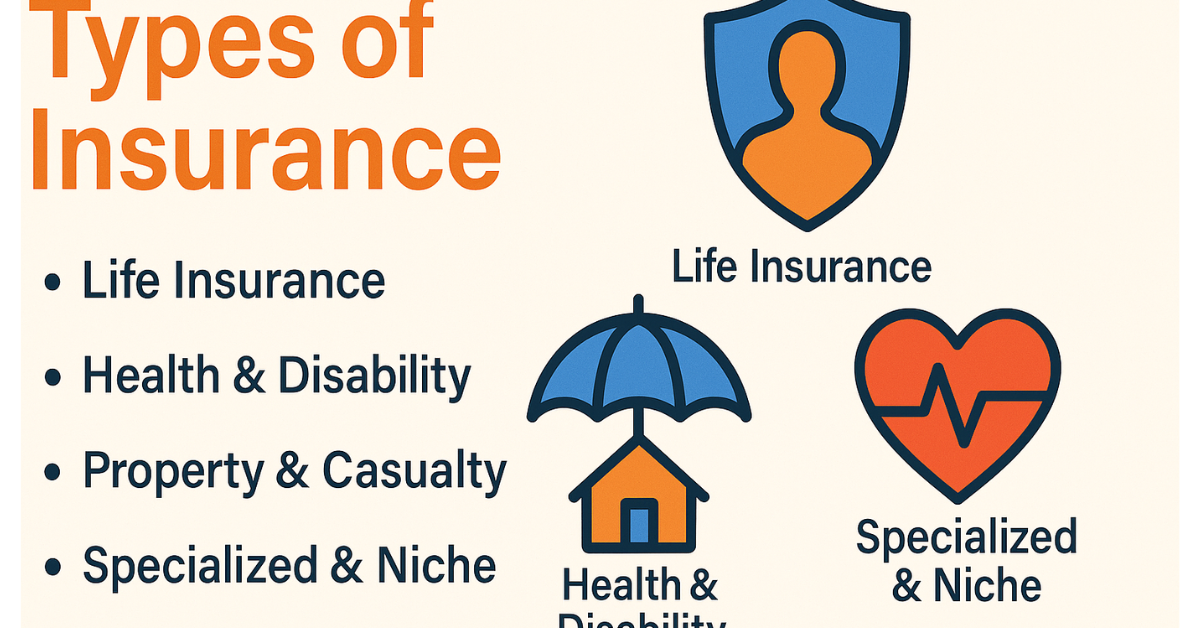There are many unknowns in life. A medical emergency, auto accident, natural calamity, or abrupt business disruption might rock your life one day, and then the next it would be all over. It may be difficult to recoup financially from such losses, which is where insurance comes in.
In essence, insurance serves as a safety net. It’s an agreement wherein you provide an insurer a monthly premium in return for financial security against certain dangers. There is an insurance coverage designed for almost every facet of life, whether it is preserving your property, your health, or the future of your family.
In order to guard against losses from caravan travel, merchants in Babylon as early as 1750 BC pooled their resources, demonstrating the ancient origins of the insurance idea. With a vast array of coverage choices for both people and corporations, the insurance sector has grown into a multitrillion dollar worldwide market today.
We’ll go over the main insurance categories, their advantages, and how to choose the best coverage for your need in this article.
1. Life Insurance
When you die away, life insurance gives your beneficiaries a monetary settlement (the death benefit). This guarantees your loved ones’ financial stability even in the event that you are unable to provide for them.
Key Life Insurance Term Types Life Insurance
Definition: Non-cash coverage for a certain period (e.g., 10, 20, or 30 years).
Ideal for: Reasonably priced insurance for debt repayment, child education expenses, or income replacement.
Example: To cover the years their children will be raised, a young parent purchases a 20-year term life insurance.
Whole Life Coverage
Definition: Lifetime insurance that includes a cash value component that increases over time and a guaranteed death payment.
Ideal for: Creating funds that you can borrow against and long-term safety.
Life Insurance for All
Definition: Adjustable death benefits and flexible premium payments with an investment component.
Ideal for: People looking for a policy that can be customized and has the potential to provide larger profits.
Plans for Endowments
Definition: Insurance that makes a one-time payment at the conclusion of the insurance term or upon death.
Ideal for: People looking for safety and savings.
Benefits include debt repayment, estate planning, and dependents’ financial stability.
2. Insurance for Health and Disability
Disability insurance compensates lost income in the event that you are unable to work, while health insurance assists with the expense of medical treatment.
Prescription medications, hospital stays, surgeries, doctor visits, and preventative care are all covered by health insurance.
Variants
- A one-time payment for severe illnesses like cancer or stroke is provided by critical illness insurance.
- The focus of dental and vision insurance is on maintaining good oral and visual health.
- Emergencies when traveling overseas are covered by travel health insurance.
Insurance for Income Protection and Disability
Temporary Disability: Provides coverage for a temporary incapacity to work brought on by a sickness or accident.
Long-Term Disability: Permanently or temporarily replaces income.
For instance, if a construction worker with disability insurance gets hurt on the job and is unable to return to work for months, their policy will reimburse a percentage of their missed income.
Advantages: Keeps medical expenses or lost wages from ruining your finances.
3. Insurance for Property and Casualty
Policies that insulate you from responsibility and safeguard your assets fall under this category.
Insurance for Real Estate
- Homeowners insurance protects your home’s structure, possessions, and liabilities for accidents that occur on your land.
- Renters insurance protects the personal belongings of renters.
- Hurricane, earthquake, and flood coverage are examples of natural disaster add-ons.
- Liability coverage for auto insurance covers harm or damage to other people if you are at fault.
Collision: Covers your own vehicle’s damage in an accident.
Comprehensive: Provides coverage for non-collision damage, theft, and vandalism.
Insurance for Liability
General Liability: Includes claims for property damage or physical harm.
- Professionals are shielded from charges of carelessness by professional liability (errors and omissions).
- Additional liability coverage above and beyond the usual limitations is known as umbrella insurance.
Advantages: Lowers legal risks and protects valuable assets.
4. Niche & Specialized Insurance
- Specialized coverage is necessary since not all hazards fall into one of the established categories.
- Travel insurance covers emergency evacuation, lost baggage, and trip cancellations.
- Pet insurance covers medical expenses for accidents, diseases, and preventative treatment.
- Costs associated with assisted living, nursing homes, and in-home care are covered by long-term care insurance.
Cyber insurance: defense against online fraud, data theft, and hacking.
For instance, after a data breach, an online merchant purchases cyber insurance to pay for consumer notifications and legal fees.
5. Commercial and Business Insurance
- This coverage guards against operational hazards and is intended for companies of all sizes.
- Commercial property insurance covers damage to inventory, machinery, and structures.
- Business interruption insurance covers lost revenue during unplanned downtime brought on by natural catastrophes.
- Workplace injuries are covered by workers’ compensation and employer’s liability insurance.
- Specialized Policies: bonds for building, aviation, and marine.
Advantages: Maintains legal compliance and corporate operations.
How to Pick the Appropriate Insurance
Evaluate Your Hazards: Take into account your career, assets, dependents, lifestyle, and health.
Establish a Budget: Refrain from taking on more insurance than you can afford.
Examine coverage, exclusions, restrictions, and prices while comparing policies.
Review Frequently: As life circumstances change, update your coverage.
- Avoid these common mistakes by merely purchasing the cheapest insurance without carefully examining the coverage.
- not providing pertinent information while applying.
- failing to notify beneficiaries of changes in their lives.
- Missed payments cause letting policies to expire.
Conclusion:
In addition to being required by law, insurance is essential to sound financial management. The proper insurance plans provide a safety net against life’s unforeseen obstacles, from safeguarding your house, vehicle, and company to preserving your health and income.
Finding a balance between cost and sufficient protection is crucial. You may build a coverage portfolio that offers you comfort, safeguards your loved ones, and guarantees you’re ready for anything by being aware of the many insurance options accessible and assessing your own risk profile.


